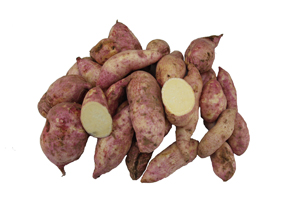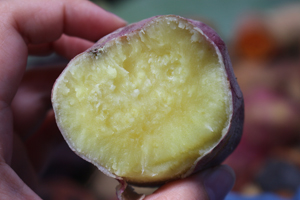 To maintain supply of sweetpotato for its restaurant offering, “spring chicken with sweetpotato fries,” Max’s chain of restaurants requested support from the Philippine Council for Agriculture, Aquatic and Natural Resources Research and Development of the Department of Science and Technology (DOST-PCAARRD). Specifically, the restaurant chain requested support to develop the supply chain of appropriate nutrient-rich sweetpotato variety that can produce quality fries.
To maintain supply of sweetpotato for its restaurant offering, “spring chicken with sweetpotato fries,” Max’s chain of restaurants requested support from the Philippine Council for Agriculture, Aquatic and Natural Resources Research and Development of the Department of Science and Technology (DOST-PCAARRD). Specifically, the restaurant chain requested support to develop the supply chain of appropriate nutrient-rich sweetpotato variety that can produce quality fries.
PCAARRD provided assistance to Max’s through the project, “Support Systems for Sweetpotato (SP) Value Chain Development and Establish SP Value Chains in Leyte-Samar” implemented by the Visayas State University-Philippine Rootcrops Research and Training Center (VSU-PhilRootcrops). The project is under the PCAARRD-funded Sweetpotato Industry Strategic S&T Program (SP-ISP).
Max’s chain of restaurants currently engages VSU-PhilRootcrops and Nutri-pros, a private food business entity leading a farmers’ group.
Through the project, three hectares of PSB SP 17, a recommended high-yielding variety for fries because of its quality and shelf life, has been established in Antipolo. The nursery will supply a 20-hectare production area, with production scheduling to sustainably meet Max’s volume requirements.
Early 2019 is the expansion period, with about 60-hectare identified areas in Antipolo and Bulacan. Max’s also needed sweetpotato powder for various culinary uses, since it can be made into quality products by their innovative chefs. VSU recommended the Super Bureau variety or VSP 6, which will soon be produced from quality planting materials in Tarlac.
The development of the sweetpotato supply chain is now in full swing to meet the demand. This partnership with Max’s can also mean access to the company’s corporate social responsibility (CSR) program that can benefit farmers both in production and processing.
With health and well-being as core values of the Max’s food chain, sweetpotato is being produced using aloe vera cum seaweed-based soil enhancer and biopesticide. VSU’s initial output with minimal solution application yielded 35 tons/ha, which surpassed the target yield of the SP-ISP.
With Max’s and PCAARRD’s partnership, sweetpotato is emerging as an important component of the health food industry in the country using the outputs of S&T, including varieties, production techniques, and product applications that DOST-PCAARRD has long supported in its R&D with a strong belief in the potential of the crop.
There are other players in the food industry that are fast recognizing the potential of sweetpotato, who are requesting information and assistance from the R&D community. The coming years will experience a big leap in technology transfer following the value chain modality with the strong collaboration between the S&T community and industry.
‘Camote’ or sweetpotato (Ipomoea batatas) has been known in the global market as a superfood. It is a starchy rootcrop loaded with vitamins, minerals, and micronutrients; has low glycemic index; and quality dietary fiber. The different flesh colors spell its nutrient load: white-flesh camote has more calcium; yellow to orange is loaded with beta carotene; while purple camote is high in anthocyanins. Its rich and dense nutrient spells its anti-oxidant property.
 Sweetpotato grows in a wide range of environments. It has low-input demand and garden-friendly since it can be easily grown for home food or extra livelihoods. Its form, quality, and adaptability make it a climate-smart crop for food, feed, and industry.
Sweetpotato grows in a wide range of environments. It has low-input demand and garden-friendly since it can be easily grown for home food or extra livelihoods. Its form, quality, and adaptability make it a climate-smart crop for food, feed, and industry.
It took some time before camote received positive nod in the social circles in this country. In the past, camote has been associated with poverty and low food status; even used in derogatory manner when one is slow-brained. Other than China, the US, Japan, and South Korea, only in recent decade has there been an emerging interest and excitement over sweetpotato in the Philippines.
In the first decade of this millennium, DOST-PCAARRD had supported S&T of sweetpotato as part of the food solution in disasters and emergencies and continues to support sweetpotato value chains in industry strategic programming.
